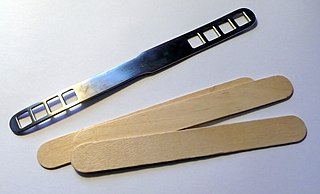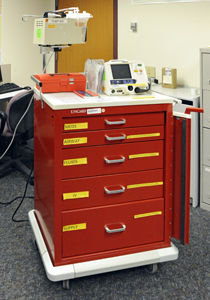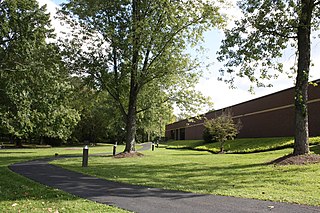
Jefferson , commonly known as Thomas Jefferson University, is a private university in Philadelphia, Pennsylvania. It was formed in 2017 through the merger of Philadelphia University and Thomas Jefferson University.

Alan Graham MacDiarmid, ONZ FRS was a New Zealand-born American chemist, and one of three recipients of the Nobel Prize for Chemistry in 2000.

A medical device is any device intended to be used for medical purposes. Thus what differentiates a medical device from an everyday device is its intended use. Medical devices benefit patients by helping health care providers diagnose and treat patients and helping patients overcome sickness or disease, improving their quality of life. Significant potential for hazards are inherent when using a device for medical purposes and thus medical devices must be proved safe and effective with reasonable assurance before regulating governments allow marketing of the device in their country. As a general rule, as the associated risk of the device increases the amount of testing required to establish safety and efficacy also increases. Further, as associated risk increases the potential benefit to the patient must also increase.
Walter Jackson Freeman II was an American physician who specialized in lobotomy.
A patient safety organization (PSO) is a group, institution or association that improves medical care by reducing medical errors. In the 1990s, reports in several countries revealed a staggering number of patient injuries and deaths each year due to avoidable adverse health care events. In the United States, the Institute of Medicine report (1999) called for a broad national effort to include the establishment of patient safety centers, expanded reporting of adverse events and development of safety programs in health care organizations. The organizations that developed ranged from governmental to private, and some founded by industry, professional or consumer groups. Common functions of patient safety organizations are data collection and analysis, reporting, education, funding and advocacy.
Telepsychiatry is the application of telemedicine to the specialty field of psychiatry. The term typically describes the delivery of psychiatric assessment and care through telecommunications technology, usually videoconferencing. Telepsychiatry services can be offered through intermediary companies that partner with facilities to increase care capacities, or by individual providers or provider groups. Most commonly, telepsychiatry encounters take place at medical facilities under the supervision of onsite staff, though at-home models are becoming accepted as long as they are in compliance with HIPAA standards.

John Ercel Fryer, M.D. was an American psychiatrist and gay rights activist best known for his anonymous speech at the 1972 American Psychiatric Association (APA) annual conference where he appeared in disguise and under the name Dr. Henry Anonymous. This event has been cited as a key factor in the decision to de-list homosexuality as a mental illness from the APA's Diagnostic and Statistical Manual of Mental Disorders. The APA's "John E. Fryer, M.D., Award" is named in his honor.
The Center for Emergency Medicine of Western Pennsylvania is a multi-hospital consortium based in Pittsburgh, Pennsylvania. It is claimed to be one of the world's premiere

The Lewis Katz School of Medicine at Temple University (LKSOM), located on the Health Science Campus of Temple University in Philadelphia, PA, is one of 7 schools of medicine in Pennsylvania conferring the M.D. degree. It also confers the Ph.D. and M.S. degrees in biomedical sciences. In addition, LKSOM offers a Narrative Medicine Program.
Raymond Joseph "Ray" Broderick was a jurist and politician from Pennsylvania. A member of the Republican Party, he served as the 24th Lieutenant Governor of Pennsylvania from 1967 to 1971 and as a United States District Judge of the United States District Court for the Eastern District of Pennsylvania.

Ronald D. Castille served on the Supreme Court of Pennsylvania from 1994 to 2014 and was Chief Justice from 2008 to 2014. He stepped down from the court in 2014, after reaching the mandatory retirement age of 70.

Patrick Leo Meehan is a former federal prosecutor and a former Republican member of the United States House of Representatives, who represented Pennsylvania's 7th congressional district. He was first elected in 2010 and resigned his seat in 2018. The district includes parts of Delaware County, Chester, Montgomery County, Berks, and Lancaster. He succeeded Democrat Joe Sestak, who ran unsuccessfully for the United States Senate.
Ira Barrie Black was an American physician and neuroscientist who was an advocate of stem cell research and was the first director of the Stem Cell Institute of New Jersey at Robert Wood Johnson Medical School which was created to advance research in the field.
Roger Krevin Leir was an American podiatric surgeon and ufologist best known as an investigator of alleged alien implants. Leir wrote books such as The Aliens and the Scalpel, and appeared on various radio and television shows, including Coast to Coast AM, claiming he had discovered proof of "non-terrestrial experimentation on man".
Now part of Jefferson Health, Aria Health is a healthcare system in Northeast Philadelphia and Lower Bucks County. It consists of three hospitals and a number of outpatient clinics.

The Penn Medical Emergency Response Team (MERT) is the University of Pennsylvania's student-run volunteer emergency medical services organization, providing care to students, faculty, staff and community members. MERT's primary responsibility is to provide quick-response emergency medical care before Philadelphia Fire Department paramedic units are available to provide patient transport. The secondary purpose of MERT is to provide education to the Penn community, specifically CPR training and alcohol education.

On May 12, 2015, an Amtrak Northeast Regional train from Washington, D.C. bound for New York City derailed and wrecked on the Northeast Corridor in the Port Richmond neighborhood of Philadelphia, Pennsylvania. Of 238 passengers and 5 crew on board, 8 were killed and over 200 injured, 11 critically. The train was traveling at 102 mph (164 km/h) in a 50 mph (80 km/h) zone of curved tracks when it derailed.

Sean Patrick Conley is an American physician and United States Navy officer who is the incumbent Physician to the President.

















